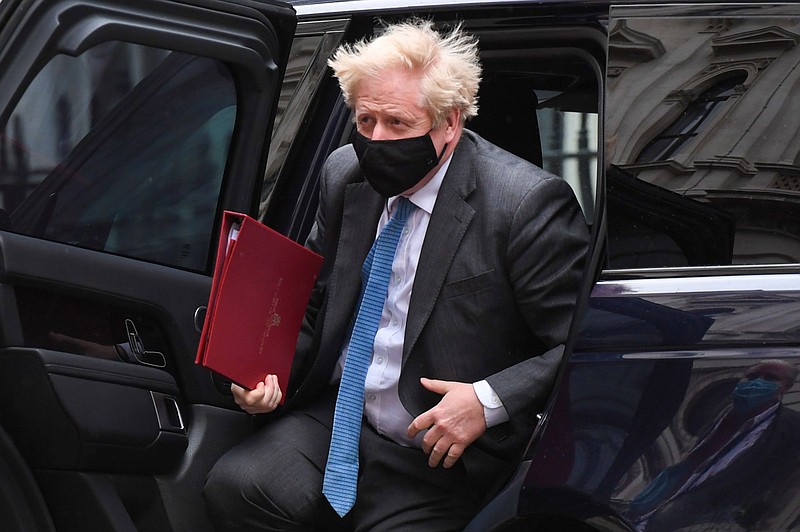British Prime Minister Boris Johnson said coronavirus lockdown rules are set to be scrapped in seven weeks' time, as he hailed the U.K.'s successful vaccine rollout ahead of key elections this week.
On the campaign trail, Johnson said the pandemic data was likely to allow people in England to stay overnight with friends or relations, with indoor hospitality able to reopen from May 17.
Remaining social-distancing rules also likely are to be canceled from June 21, he added, although he warned that international travel will need to be carefully monitored after May 17 to avoid reimporting the virus.
The prime minister is making his case to millions of voters in England, Wales and Scotland who are taking part in elections on Thursday. At stake is who gets to govern London and Scotland, as well as more than 140 English districts.
In Scotland, the prospect of a new referendum on independence from the rest of the U.K. hangs in the balance, depending on the result.
After a year on the back foot defending a pandemic strategy that delivered the worst death toll in Europe, Johnson has spent much of 2021 championing his government's success at rolling out vaccines faster than most other wealthy nations.
"With the vaccine rollout going the way that it is -- we have done 50 million jabs as I speak to you today, quarter of the adult population, one in four, have had two jabs," the prime minister said on a visit Monday to Hartlepool in northeastern England.
"You are seeing the results of that really starting to show up."
He said the next stage in the government's plan to gradually ease lockdown on May 17 was on track. "But it also looks to me as though we'll be able to say social distancing as we currently have to do it, the 1-meter plus, I think we have got a good chance of being able to dispense with the one-meter plus from June 21."
Currently under "1-meter plus" guidelines, people are advised to maintain a distance of at least a meter, about 3 feet, from one another indoors, while wearing a face covering or taking other protective measures. Removing the rule could allow businesses and citizens to return to something closer to pre-pandemic normality.
But speaking on Tuesday, Trade Secretary Liz Truss urged people to hold off booking overseas holidays until the so-called travel task force issues its findings. The government has previously said nonessential travel will be allowed from May 17 at the earliest.
"The really important thing is that we don't move too fast and jeopardize the progress we've made, so people will have to wait a bit longer, I'm afraid, to be able to hear the news on exactly what's happening on the travel front," Truss told Sky News. "We need to be cautious and we need to make sure that we're not simply importing the virus after we've successfully dealt with it in Britain."
DOSES FOR BALKANS
Separately, the European Union started delivering EU-funded coronavirus vaccines Tuesday to the Balkans, a region that wants to join the 27-nation bloc but where China and Russia already have been making political gains by supplying the much-needed shots.
The European Commission last month announced that 651,000 Pfizer-BioNTech doses will be delivered to Serbia, Bosnia, North Macedonia, Montenegro, Albania and Kosovo in weekly instalments from May to August. The vaccines are funded from an $85 million package adopted by the commission in December.
Most of the Balkan countries have struggled to get coronavirus vaccines, except for Serbia, which opened a successful inoculation campaign mainly thanks to millions of doses of China's Sinopharm and Russia's Sputnik V vaccines, which have so far not been approved by the EU's drug administrator.
Following on the footsteps of Serbia, the other western Balkan nations have been turning to China and Russia for jabs as EU nations faced their own vaccine delays.
Meanwhile, the EU's drug regulator announced Tuesday that it has started a rolling review of China's Sinovac coronavirus vaccine to assess its effectiveness and safety, a first step toward possible approval for use in the bloc.
The European Medicines Agency said Tuesday that its decision to start the review is based on preliminary results from laboratory studies and clinical studies.
"These studies suggest that the vaccine triggers the production of antibodies" that fight the coronavirus "and may help protect against the disease," the agency said in a statement.
The European Medicines Agency, which so far has approved four coronavirus vaccines, added that no application seeking marketing authorization for the Sinovac vaccine has been submitted yet. The agency also is conducting rolling reviews of three other vaccines: the one developed by German biotech company CureVac, the American-developed Novavax and Russia's Sputnik V.
The agency said its experts will "evaluate data as they become available to decide if the benefits outweigh the risks" of the vaccine. The rolling review will continue until "enough evidence is available for a formal marketing authorization application," the agency said, adding that it could not predict timelines.
The announcement from the Amsterdam-based agency was made a day after a top World Health Organization official said the WHO is set to decide this week whether to approve two Chinese covid-19 vaccines for emergency use.
Such approval would mark the first time that a Chinese vaccine had been granted a so-called emergency use listing from the U.N. health agency, and would trigger a broader rollout of Chinese vaccines that are already being used in some countries beyond China.
Information for this article was contributed by Tim Ross of Bloomberg News (WPNS); and by Mike Corder, Dusan Stojanovic, Raf Casert and Sabina Niksic of The Associated Press.
